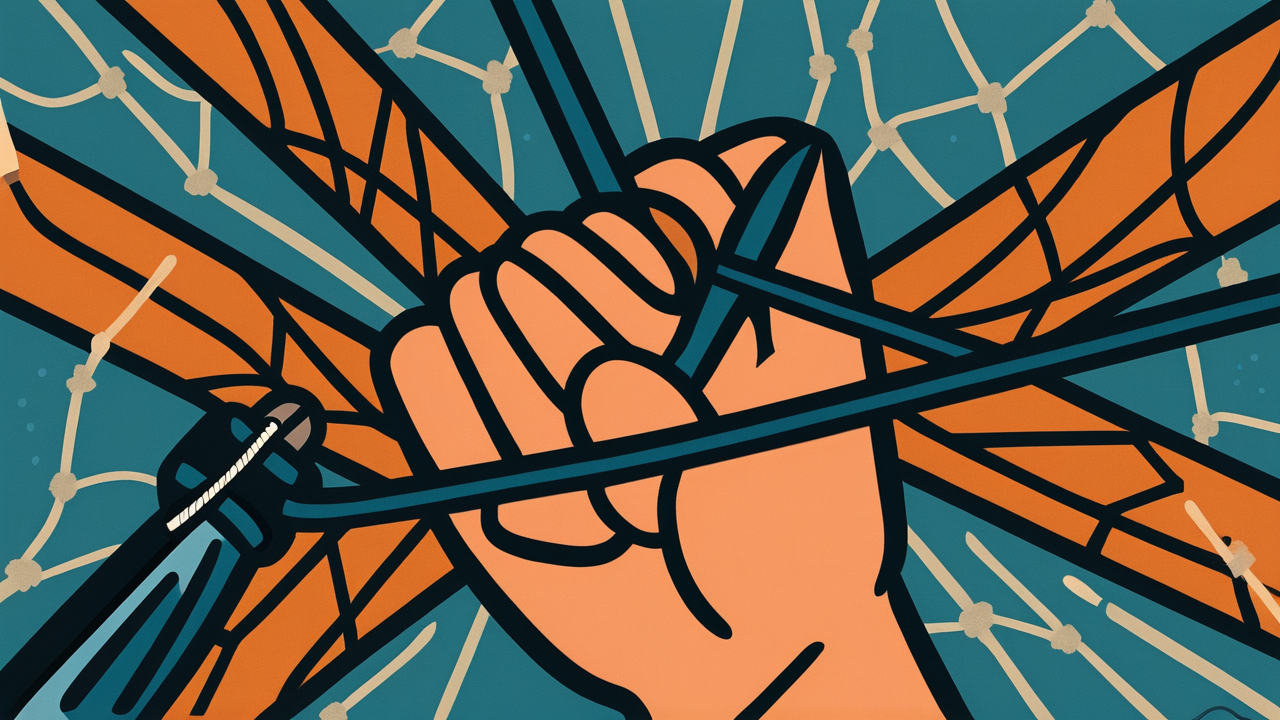How to Read “快刀乱麻を断つ”
Kaitō ranma wo tatsu
Meaning of “快刀乱麻を断つ”
“Sharp sword cuts tangled hemp” means to solve complex and difficult-to-resolve problems or confused situations all at once through appropriate means or excellent ability.
This proverb is used when someone has brilliantly resolved troublesome problems that couldn’t be solved for a long time, or complex situations that many people have been struggling with, all in one stroke. Rather than carefully untangling intertwined threads, it expresses achieving fundamental resolution without taking time, like cutting through with a sharp sword.
What’s important is not simply handling problems through brute force, but solving them through “sharp sword” – that is, excellent judgment and appropriate methods. Even today, it’s used in situations where a new leader gets a long-stagnant project back on track in a short time, or someone’s quick thinking resolves complex interpersonal entanglements. This proverb embodies the importance of decisiveness and execution ability in problem-solving.
Origin and Etymology
“Sharp sword cuts tangled hemp” is a proverb originating from Chinese classics. The origin of this expression is said to be found in the historical records of the Northern Qi Dynasty’s “Book of Northern Qi,” recorded in the anecdotes of Wen Tianxiang.
“Sharp sword” refers to a blade with keen cutting ability, while “tangled hemp” refers to hemp threads that are intertwined and disordered. In other words, it originated from the meaning that no matter how complexly hemp threads are entangled, they can be cut in two with a well-sharpened sword.
In this historical anecdote, it was used as a metaphor for solving complex and difficult-to-resolve problems all at once through appropriate means or excellent ability. While untangling entangled hemp threads would take time, cutting through with a sharp sword could resolve the situation instantly.
It’s believed to have been introduced to Japan along with Buddhist literature and Chinese classics from the Heian to Kamakura periods, and this expression can be found in Edo period literature as well. Particularly among the samurai class, it seems to have been valued as a word expressing decisiveness and execution ability. In Japan’s samurai society, where swords were familiar weapons, this metaphor was very easy to understand and was accepted as a persuasive expression.
Usage Examples
- The new department manager resolved the long-standing interdepartmental conflict like Sharp sword cuts tangled hemp
- Her proposal cleared up the budget problem like Sharp sword cuts tangled hemp, which was really helpful
Modern Interpretation
In modern society, while the value of “Sharp sword cuts tangled hemp” is being reevaluated, its application requires increasing caution.
In our information society, complex problems are more multifaceted and interrelated, so decisive solutions are not necessarily always the best approach. For example, in corporate restructuring or organizational reform, while it may appear effective in the short term, there’s a risk of creating new problems in the long term. With the diversification of stakeholders, unilateral decisions increasingly risk unexpected backlash.
However, this spirit is highly valued in the world of digital transformation and startups. The concept of “disruption” – not clinging to conventional methods but solving existing challenges all at once with innovative solutions – is precisely the thinking of Sharp sword cuts tangled hemp. Business automation through AI technology and elimination of intermediaries through blockchain can also be considered modern versions of this concept.
In modern times, attention is increasingly focused on the essence of this phrase: “fundamental resolution through appropriate means.” True “sharp sword” is not mere brute force, but strategic problem-solving based on data analysis and specialized knowledge.
When AI Hears This
Modern people collect vast amounts of information to make a single decision, ultimately becoming exhausted and unable to decide at all. They compare hundreds of job listings on career websites, analyze countless charts on investment apps, and endlessly read reviews just to choose a restaurant. This phenomenon is called “decision fatigue” in psychology, and it’s been proven that too many choices significantly impair human judgment.
What’s fascinating is research showing that even when information increases tenfold, decision quality improves by less than 10%. In fact, people who make quick decisions with 80% of the information often achieve better results than those who agonize endlessly seeking perfection. This captures the very essence of “cutting through the Gordian knot with a swift blade.”
When comparing people who endlessly seek career advice on social media with those who interview at three companies and decide based on intuition, the latter group notably shows higher satisfaction rates. This is because the speed of decision-making itself enhances subsequent initiative and adaptability.
In modern society, there’s a widespread illusion that “gathering information equals making smart choices,” but the reality is that “deciding at the right moment equals the best results.” Just as ancient Chinese emperors resolved complex political problems with decisive action, modern people should have the courage to make decisions before drowning in an ocean of information. Taking action with a good answer is far more valuable than waiting for the perfect one.
Lessons for Today
“Sharp sword cuts tangled hemp” teaches modern people the importance of “appropriate timing” and “accurate means selection” in problem-solving.
We face various problems, large and small, every day. Most of them should be handled carefully over time, but some problems should be resolved decisively all at once. What’s important is developing the judgment to discern which approach is appropriate.
In modern society, we tend to delay decisions due to information overload, but sometimes we need the courage to make decisions without waiting for “perfect information.” From smartphone upgrades to career changes, we have daily opportunities to wield our “sharp sword.”
This proverb also teaches us the importance of not overcomplicating problems. Solutions might be surprisingly simple. If we can live without being swayed by others’ opinions, maintain eyes that see through to the essence, and act without hesitation when necessary, our lives should become much lighter. When facing difficult situations, remember these words.



Comments